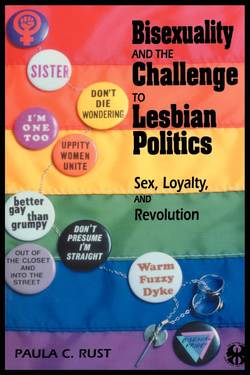Читать книгу Bisexuality and the Challenge to Lesbian Politics - Paula C Rust - Страница 37
На сайте Литреса книга снята с продажи.
WHAT ARE BISEXUALS LIKE?
ОглавлениеThe question “How do lesbians picture bisexual women?” bears a disquieting resemblance to questions like “How do whites picture blacks?” and “What is the male ideal of womanhood?” In the past few decades, we as a society have become increasingly sensitive to the dynamics of stereotypy and oppression. One after the other, oppressed groups among us have begun to resist the economic, social, and political structures that cause their disadvantage, fighting to change not only these structures but also the prejudicial attitudes of the powerful members of society who benefit from the same structures. As a result, those of us who are oppressed ourselves or who are sincere in our hatred of oppression have become sensitized not only to sexism, racism, heterosexism, ableism, and age-ism in particular, but also to the form of prejudicial thinking in general. We are suspicious of any statement that sounds like a generalization or that refers to people as members of groups instead of individuals.
Making generalizations about the objects in our environments, including other people, is a natural and necessary human skill. Generalization involves overlooking individual differences in the effort to find similarities. Without this skill, we would be unable to learn from our experiences, unable to plan future activity, largely unable to communicate with each other, and unable to empathize with the experiences of other people. So when does this natural and necessary capacity for generalization become objectionable? It becomes problematic when the objects we generalize are other human beings, and when our capacity to perceive similarities impedes our ability to perceive individual differences as well. At that point, we begin to see other people as no more than group representatives and we begin to treat them as members of categories instead of individuals. We then look at Black people and see nothing but black; we look at White people and see nothing but white. Instead of facilitating social interaction, our ability to generalize becomes an obstacle to social interaction that robs others of their individuality by replacing it with stereotypes.
